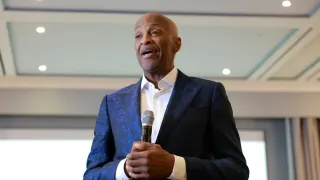November 28, 2020
Big Freedia's Booked; Celebrates Paperback Memoir Release Online with Regional Bookstores
Jim Provenzano READ TIME: 2 MIN.
The Queen of Bounce will share stories from his new book, God Save the Queen Diva. The New Orleans musician and reality show star will chat with hosts of bookstores nationwide, from Philadelphia, to Tulsa, Austin, Fairfield and Los Angeles.
The musician's memoir chronicles his life as a poor choirboy from New Orleans who survived poverty, drugs, and bullying to become a world famous musical performer and reality personality on the Fuse TV series.
Known for advancing the vibrant culture of Bounce, Big Freedia is credited for bringing the "twerk" to mainstream fans. Published in hardback in 2018, Big Freedia's new paperback edition contains a gallery of childhood photos, along with fascinating stories.
Big Freedia's collaborators include Beyonc�, Drake, Lizzo and Kesha, and Ben & Jerry's even created a limited run ice cream flavor, Big Freedia's Bouncin' Beignets. Along with multiple music projects, Big Freedia also hosts weekly (often hilarious) Garden Cookout shows on Instagram, YouTube and Facebook. Big Freedia performed at SF Pride's 2020 online celebrations, and headlined the mainstage events in 2007.
The twelve book events kick off Dec 1, 1 pm at Philly AIDS Thrift/Giovanni's Room on Instagram Live, and continue through December 8 with The Los Angeles Review of Books. You can order books in advance from participating shops and your local independent bookstore (as well as big corporate websites).
For details, music and chat links, visit www.bigfreedia.com
Help keep the Bay Area Reporter going in these tough times. To support local, independent, LGBTQ journalism, consider becoming a BAR member.






